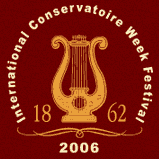
|
|||
 |
|||
 |
| VI INTERNATIONAL
CONSERVATOIRE WEEK FESTIVAL CONCERT RPOGRAM |
|
OCTOBER 20, FRIDAY OFFICIAL OPENING CEREMONY OF THE FESTIVAL
PETER TCHAIKOVSKY (1840ľ1893) Sergei NIKOULSHIN, tenor. Igor URIASH, piano. The Orchestra of the State Hermitage. The Artistic Director and conductor Ś Saulius SONDECKIS DMITRY SHOSTAKOVICH ůLooking back at those years when I studied with Shostakovich I frequently come to the thought, that they were the best of all possible groundings Ś in the widest sense of that word. Shostakovich was a veritable open repository of the traditions of Russian musical education, traditions left by the Rimsky-Korsakov School. He had never recognized the division of music into ôlowerö of ôhigherö forms. He demanded we test ourselves in every genre. ôA composer must compose everything!ö. He could be very different: sometimes he was very reserved but at other times he was just the opposite and was very open. He either remained silent, or discussed every important topical thing animatedly, and whatĺs more, for a long time He used to be obviously ironic or touching when he took off his spectacles. We saw him suffering (of idle talk, adulation, hypocrisy, or vulgarity) as well as laughing with joy like children do. His figure always radiated strength and not only just because of his inner strength (in his presence we literally felt the radiation of his will through some mighty energy field), but also because of his enormous courage, which had helped him to survive the illnesses he suffered from. It was hard for him to be conscious of the fact that his life was coming to its end Ś but there were no outward complaints or lamentations from his side. We only can find some reflections of this bitterness in his last works. It seems naive Ś the attempts to explain his work in one way or another, to look for some kind of concealed meaning, contrary to his own explanations. If you want to understand what sort of a person he was, the best way is to listen more and more attentively to his music: to listen without prejudice or bias. Then you will see him as he was: a man with a great soul, of tremendous sincerity, a man of great intellect and frank heart, an intransigent fighter against violence, and an impassionate defender of people and of humanity.ö Honoured Artist of USSR,
|

